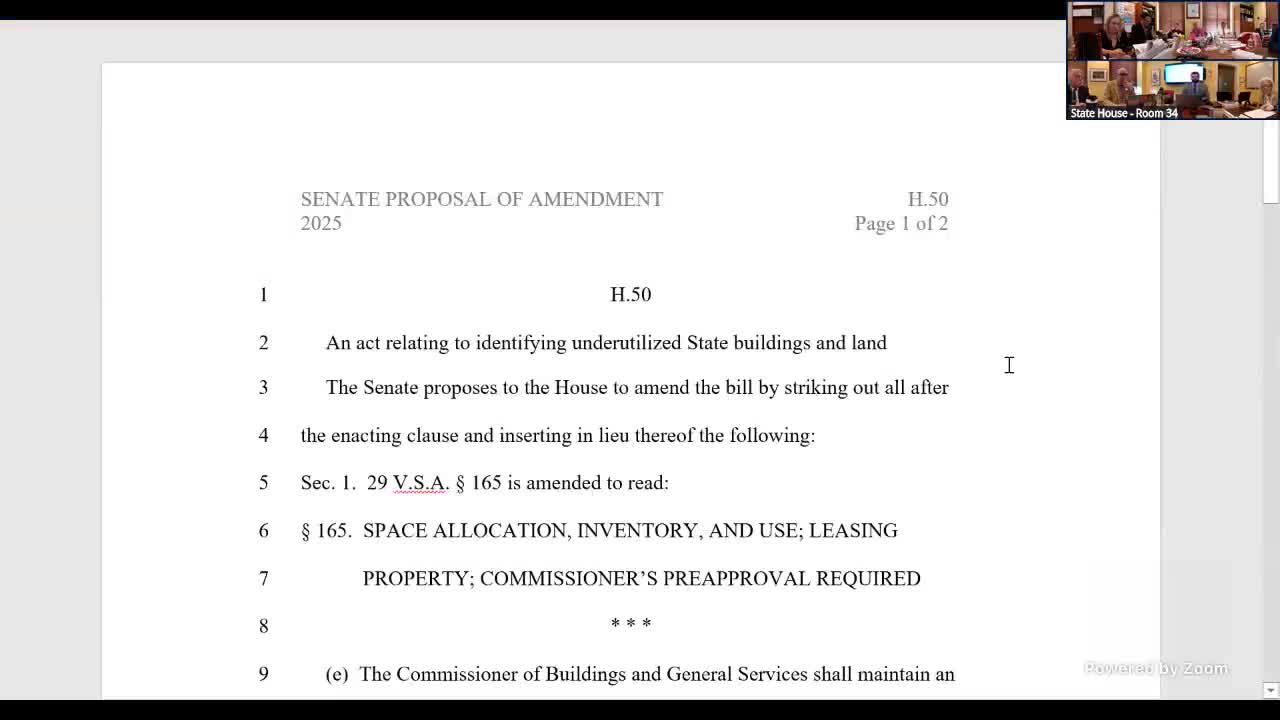House committee delays action on H.50 amendment after debate over ‘space book’ inventory of state-owned and leased property
Get AI-powered insights, summaries, and transcripts
Subscribe
Summary
The House Corrections and Institutions Committee voted to recommit H.50 to the committee after lawmakers and Buildings and General Services disagreed about language requiring an inventory of state-owned and state‑leased buildings and whether BGS must judge whether land is "unnecessary for statutory purposes."
The House Corrections and Institutions Committee on May 28 voted to recommit H.50 to the committee for further work after a lengthy debate over amended language that would expand the annual "space book" inventory to include “state owned or state leased buildings and land” and to indicate whether land is “unnecessary for statutory purposes.”
Lawmakers said the change was intended to produce a single, searchable report of state property that could reveal sites for reuse or sale; officials from Buildings and General Services (BGS) warned the amendment as written could impose new data-collection duties outside BGS’s current statutory jurisdiction. The committee’s motion to send the bill back to the committee passed on a voice/hand vote recorded as 11–7 in favor of the motion to recommit.
BGS Commissioner Wanda Manoli told the committee the phrase “state leased” in the senate amendment is best understood in the framework of the existing space book, which BGS compiles annually. "The space book is compiled annually and contains information on lands, tower leases, and buildings owned and leased by BGS," Manoli said, adding that the report already breaks down space by agency, rentable square feet, and vacancies and that BGS used the space book to set fees for state-owned space. She said the office reported 94 leases totaling about 933,000 square feet in the most recent compilation.
Legal counsel Ben Novobrowski told members the amendment is ambiguous on its face. "To be quite honest, it's not very clear what it means," he said, explaining the phrase could be read either as buildings the state owns and then leases out or as buildings the state leases from private owners. He recommended clarifying whether the committee intended to capture spaces the state pays rent for or state-owned buildings that are leased to others.
Manoli said BGS interprets the amendment to mean the state should continue to report the leases it holds and the state-owned buildings under its jurisdiction, and she cautioned that asking BGS to declare whether other agencies’ land is "unnecessary for statutory purposes" would expand BGS’s role beyond its current authority. "For [BGS] to start now collecting information on another agency that in statute should give an authority to manage their own property and their own inventory — I think that should come from them," Manoli said.
Committee members who supported the amendment said a consolidated summary would help identify properties that might be repurposed — including potential housing opportunities discussed earlier in the session — and would create a starting place for follow-up with the agencies that actually control the land. Representative Casey and others asked for a concise presentation of vacant or underused space at the start of the biennium rather than a page-by-page walk-through of the space book.
Members also pressed procedural questions about timing. Manoli said BGS is already conducting a utilization analysis and that the inventory formally compiles as of July 1 each year; she said she expects fuller utilization findings by mid‑July and that the inventory required by statute is due at the start of the next biennium (2027 under the draft language). She also noted statutory constraints on property transactions — sales must be at fair market value unless otherwise directed and leases of state-owned space are limited by statute in duration.
After discussion, Representative Mary moved to recommit the bill to the committee for work over the summer and fall and further drafting next January; the motion carried on the recorded committee count of 11–7. The committee chair said the bill can return for reconsideration next session and that members may pursue a separate committee bill or negotiated technical fixes with Senate Institutions if needed.
Next steps: BGS will continue its utilization analysis and the committee asked staff to provide a more concise presentation of the existing 2025 space book and a summary of vacant and leased space at the next available biennial presentation. The bill will return to committee work next January unless the House and Senate reach a faster agreement.
